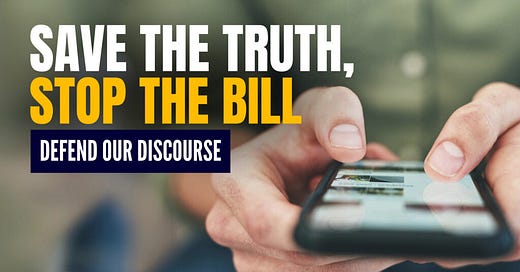Australia’s misinformation bill is on the ropes
It’s not yet officially dead, but it is very close
The Australian Labor Government says that the proliferation of misinformation and disinformation is an urgent problem and is seeking to pass new legislation to force social media platforms to clamp down on what it says are mistruths.
Despite stiff pushback from legal experts and the public, the bill passed in the House of Representatives on November 7. It now goes to the Senate, where Labor, with the possible support of the Greens, needs to shore up the votes of enough crossbench senators to pass it into law.
It looks like the Government doesn’t have the votes. Independent Senators Tammy Tyrell, David Pocock, Jacqui Lambie, and Fatima Payman have all declared their intention to vote against the bill, which is enough to block it from passing. Senator Lidia Thorpe has not yet announced her position, and Senator David Van has said he intends to vote for the bill.
If Labor decides to bring it to a vote, they will likely be cast the last week of November. Labor is undoubtedly working the phones to see if it can get anyone to flip. Pressure must be kept up to ensure these Senators hold firm, and that ideally more join them. That the Greens are even leaning towards supporting a speech suppression bill is a huge betrayal of their previous commitment to civil liberties.
The bigger the defeat, the less likely a reheated version of the bill rears its head in the future.
There are details on what you can do to bury the bill at the end of this article.
Here’s why the bill must be opposed:
1. Flawed origins: disinformation posing as ‘anti-disinformation’
The proposed misinformation legislation will extend and enforce the industry code co-written by a now-defunct "anti-disinformation" NGO First Draft. First Draft was involved in a notorious Aspen Institute campaign to suppress the Hunter Biden laptop story that revealed high-level corruption related to his business dealings in Ukraine. The Aspen Institute disinformation campaign began two months before the story was known publicly. Twitter, Facebook, and others suppressed the story, arguably impacting the outcome of the 2020 U.S. presidential election.
In other words, the Australian Communications and Media Authority (ACMA) has allowed the fox to design the hen house.
2. Platforms will be penalised for not censoring enough, but there is no penalty for overzealous censorship.
Under the proposed legislation, social media platforms face penalties of up to five percent of global revenue for not removing “misinformation”, but there is no system to measure whether platforms are over censoring, or penalties for doing so. Social media platforms will likely play it safe and over moderate, rather than risk multi-million dollar fines.
This will only worsen the existing overzealous social media censorship, especially on politically-sensitive topics.
3. Social media platforms will rely on fact-checkers, official agencies, and professional news content to determine the truth - all of which are frequently wrong.
Social media companies will be responsible for the day-to-day policing of “misinformation”. Currently, digital platforms assess the veracity of information by prioritising ‘credible and trusted news sources,’ partnering with ‘fact-checkers,’ and deferring to advice from official authorities, per the guidance of the industry code (which will become enforceable under this legislation).
But “credible and trusted news sources” routinely publish falsehoods (Joe Biden shows no signs of cognitive decline, COVID-19 vaccines stop transmission etc.) and display distinct political biases. Fact-checkers sometimes misunderstand the experts they’re quoting and make false and biased claims which amount to no more than opinions in a court of law.
And platforms using official policy positions as a proxy for ‘truth’ ensure strict adherence to political policies but automatically filter out emerging science and thought, disrupting innovation.
In a key study underpinning the ACMA’s development of its misinformation bill, researchers from the University of Canberra incorrectly classified Covid-related posts as misinformation that later turned out to be true or contestable. Instances where such a trusted centralized authority “gets it wrong” are catastrophic for public trust in institutions.
4. Censoring true information causes real-world harm.
Politicians say misinformation and disinformation must be censored to prevent harm, but censoring true information (which is inevitable under this bill) also causes harm.
This could be measured in lives lost - because of misinformation spread by authorities that Covid was not airborne, endangering the vulnerable, or because of the stifling of dissent against our support for foreign wars that claim thousands of civilian lives.
In the case of the aforementioned Hunter Biden laptop disinformation campaign propagated with the involvement of First Draft, polling suggests that some Democrats would have changed their vote had they known the story was true. By the Australian misinformation bill’s definition, this could constitute serious harm to electoral integrity.
None of these potential harms are protected against in this legislation.
5. Maybe you trust the current government. But what if the other team gets voted in?
Maybe you agree with downranking or deleting content that you think is dangerous, and so far things have mostly gone your way. But what if the tables flip and you’re on the side being censored? Remember, official government policy is one of the main metrics that digital platforms will use to determine if your content is false and/or harmful.
Progressives could be charged with overstating the impacts of climate change or exaggerating Israeli actions in Gaza, thus spreading misinformation.
6. Protections for free speech are not robust enough: ‘opinions’ and criticism of corporations and governments (or their policies) will be censored.
According to the ACMA’s explanatory memorandum, the legislation is intended to regulate “information” including “opinions, claims, commentary and invective.”
Given the broad range of potential ‘serious harms’ listed in the bill, opinions such as discussion of interest rates or criticism of a corporation’s environmental or human rights record (both of which may harm corporate reputations or Australians’ confidence in financial markets) could be censored under this legislation.
7. Governments have gone too far with censorship before.
During the pandemic, the Australian Department of Home Affairs monitored social media, flagging posts for takedown by major platforms, including jokes, true information, and content from accounts with as few as 20 followers.
In the U.S., evidence from the Twitter Files, discovery in several lawsuits, and Meta CEO Mark Zuckerberg’s own admission show that the Biden-Harris Administration pressured social media platforms to push its favoured narratives and suppress others during the Covid pandemic and in the lead-up to the 2020 election.
Governments have used ‘anti-disinformation’ initiatives to deceptively further their aims before. Chances are they’ll do it again. Especially if the laws facilitate it, which they do in this bill: the Communications Minister can flag specific issues or narratives that platforms will be legally required to demonstrate that they are monitoring and moderating (censoring).
Burying the bill
It looks likely that the bill won’t proceed in its current form, but the Greens are yet to declare their hand, current declarations could shift, and Labor hasn’t either withdrawn the bill or put it to a vote. It could also still be brought back next year in another form. The bigger the defeat the less likely we will see it again.
The politicians listed below are key:
Lidia Thorpe - [email protected] (Twitter/X)
David Van - [email protected] (Twitter/X)
Sarah Hanson-Young (Greens) - [email protected] (Twitter/X)
Adam Bandt (Greens) [email protected] (Twitter/X)
A full list of Greens senators can be found here.
It’s much harder to repeal bad laws than it is to stop them in the first place. Ultimately we need legislation to protect free speech and a stronger culture that supports it. Australians are starting to revitalise that culture through opposition to this bill.







